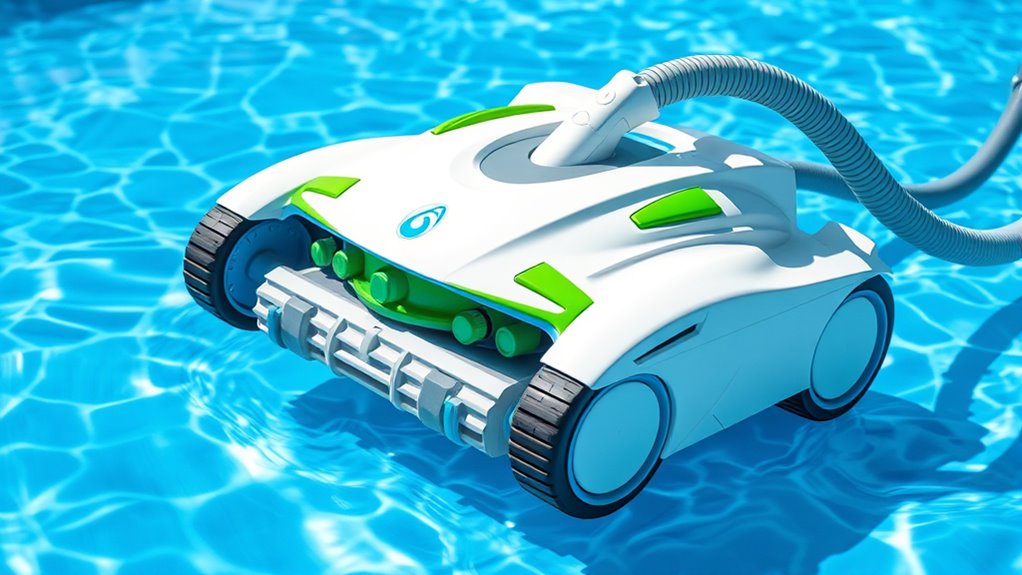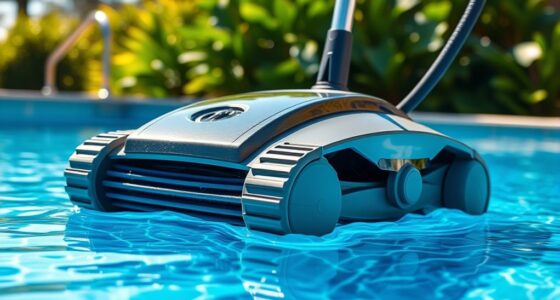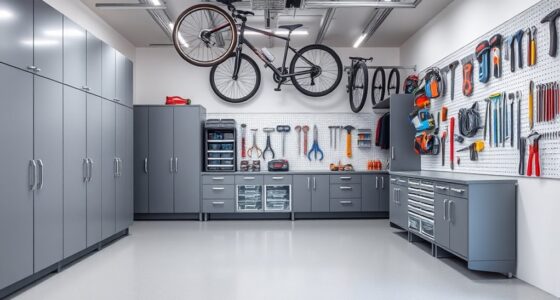When choosing a pressure pool cleaner, focus on strong suction power and efficient cleaning to remove debris effectively. Make sure it covers the whole pool with smart navigation and obstacle detection. Ease of setup, durability, and compatibility with your pool type are key. Consider energy efficiency, noise levels, and maintenance needs to save money in the long run. Keep these features in mind to find the best fit, and you’ll discover more tips as you explore further.
Key Takeaways
- Look for strong suction power and efficient cleaning coverage with advanced navigation and obstacle detection.
- Ensure compatibility with your pool type and easy-to-use control options for seamless operation.
- Choose a durable, corrosion-resistant build to withstand water, chemicals, and impact over time.
- Opt for energy-efficient models with low noise levels and simple maintenance requirements.
- Consider cost, value, and warranty to find a reliable pressure cleaner that fits your budget and long-term needs.
Suction Power and Cleaning Efficiency
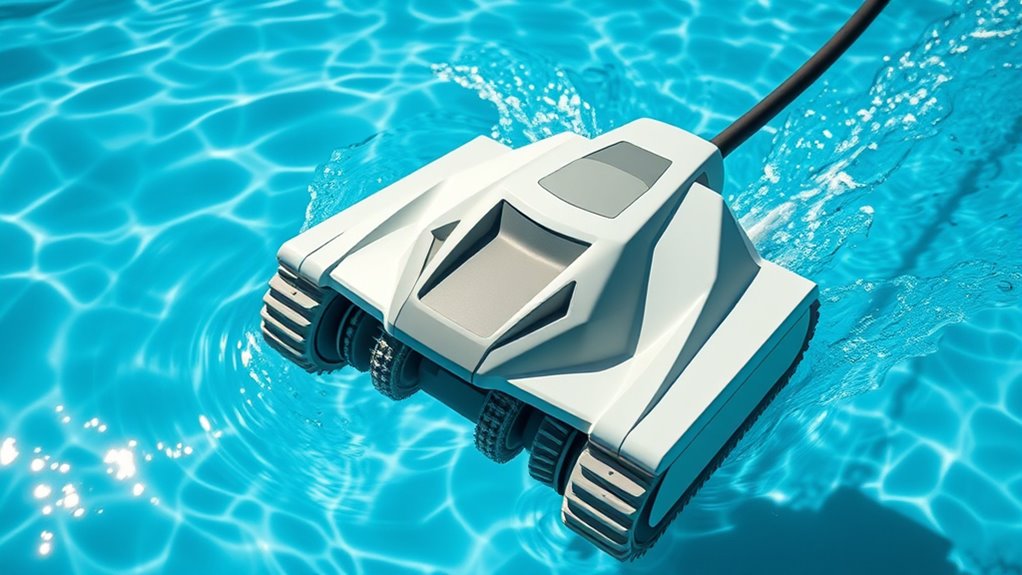
Suction power is the key factor that determines how effectively a pressure pool cleaner can remove debris from your pool. A strong filtering mechanism ensures debris is captured efficiently, preventing clogs and maintaining consistent performance. The motor design plays an essential role in providing reliable suction; a well-engineered motor delivers higher power without overheating or wasting energy. Look for cleaners with optimized motor components, as they boost suction strength and improve overall cleaning efficiency. A good filtering system traps dirt and debris quickly, reducing the need for frequent maintenance. Additionally, HEPA filtration can enhance the removal of finer particles, ensuring a cleaner pool environment. For optimal performance, consider models that incorporate advanced filtration technologies, which can further improve debris capture and prolong the lifespan of your cleaner. Combined, a powerful motor design and an effective filtering mechanism allow your pressure pool cleaner to work thoroughly, leaving your pool spotless with less effort on your part.
Coverage Area and Navigation Capabilities
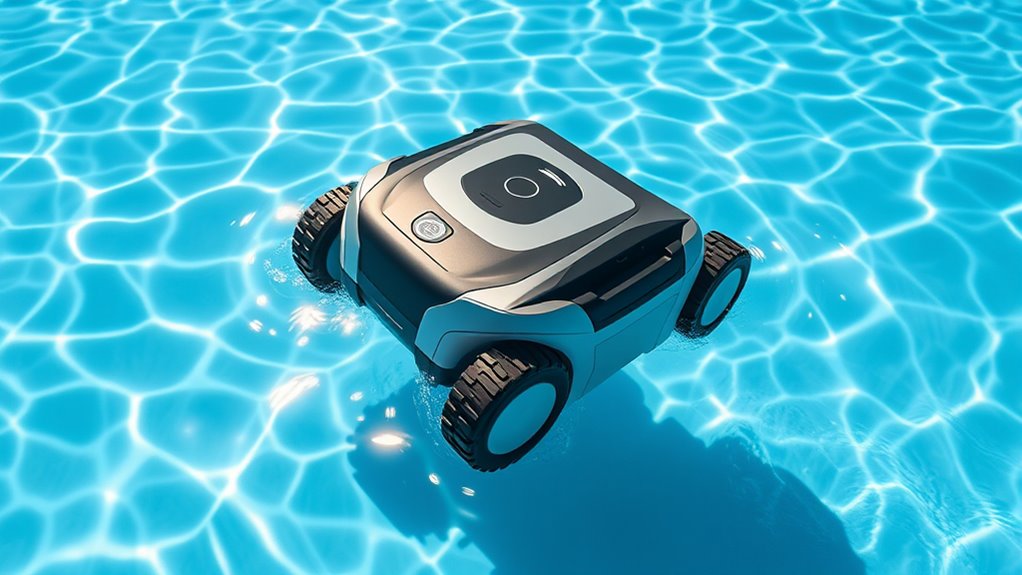
How well a pressure pool cleaner covers your pool depends largely on its navigation capabilities. Advanced robotic navigation and coverage mapping enable the cleaner to systematically identify and clean every inch of your pool efficiently. These features prevent missed spots and reduce cleaning time. Look for models with sensors that detect obstacles and edges, ensuring thorough coverage without getting stuck. Coverage mapping creates a detailed plan of the pool, guiding the cleaner to optimize coverage. The table below compares key navigation features:
| Feature | Description | Benefit |
|---|---|---|
| Robotic Navigation | Uses sensors to map and navigate the pool | Ensures systematic cleaning |
| Coverage Mapping | Creates a detailed plan of the pool layout | Prevents missed areas |
| Obstacle Detection | Identifies and avoids obstacles during cleaning | Protects pool surfaces and cleaner |
| Edge Detection | Recognizes pool edges to prevent falling or missing spots | Improves overall coverage |
| Path Planning | Strategically plans cleaning routes | Reduces cleaning time and increases efficiency |
A new sentence with self-diagnostic features and the rest of the sentence.
Ease of Setup and Installation
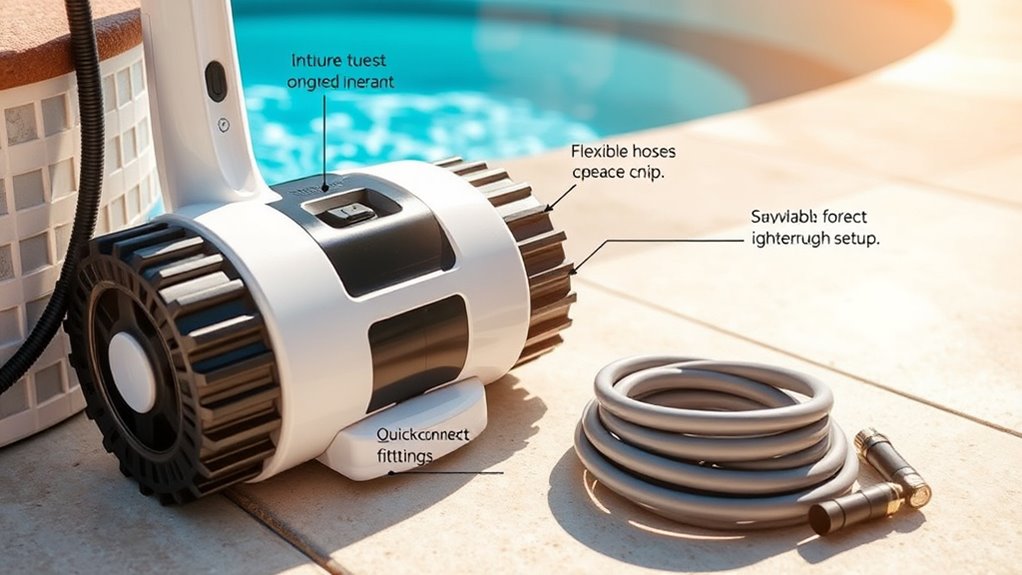
Setting up a pressure pool cleaner is generally straightforward, allowing you to get it up and running quickly with minimal hassle. First, verify your pool’s water is properly balanced with the right chemical levels, as this helps maintain the cleaner’s efficiency. Next, check the water temperature; most cleaners work best within specific ranges, so make sure your pool is within that range before installation. Attach the hoses securely and position the cleaner in the pool, following the manufacturer’s instructions. Many models feature quick-connect fittings that simplify setup. Once installed, turn on your pool pump and verify that the cleaner moves smoothly across the surface. Proper pressure regulation is essential to ensure optimal performance and prevent damage to the cleaner. Ensuring the water chemistry is balanced helps improve the overall operation and longevity of the equipment. Additionally, understanding angel number meanings can help you recognize signs of harmony and compatibility with your pool maintenance routine. Regularly checking hose connections can prevent leaks and ensure consistent cleaning performance. Being aware of proper maintenance practices can extend the lifespan of your cleaner and keep it functioning effectively. With a little preparation, your pressure pool cleaner will be ready to tackle debris effortlessly.
Durability and Build Quality
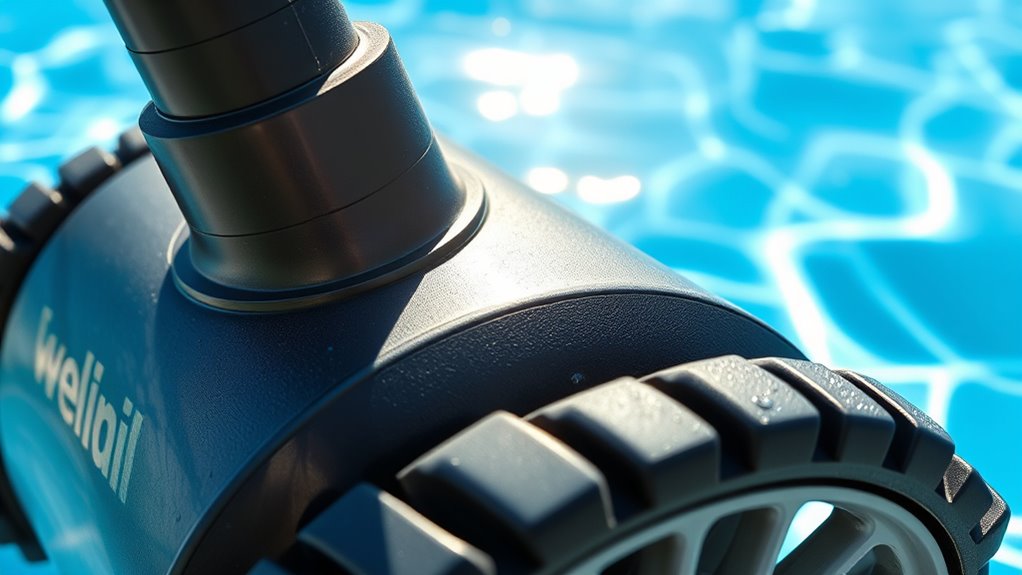
You want a pressure pool cleaner that lasts season after season, so pay attention to its material build. Look for sturdy construction that can handle regular use without breaking down. Additionally, choose models with corrosion resistance to keep them in top shape over time. For added durability, consider models made with high-quality materials that withstand harsh environments and frequent exposure to water. Incorporating digital literacy programs or maintenance tips can further extend the lifespan and performance of your pressure pool cleaner. Emphasizing industry transformations, such as the adoption of advanced materials, can also guide you toward more resilient options.
Sturdy Material Construction
A pressure pool cleaner’s durability largely depends on the quality of its materials, making sturdy construction essential for long-lasting performance. When choosing a cleaner, look for models built with impact-resistant materials that can withstand collisions with pool walls or debris. These sturdy materials ensure your cleaner can handle daily use without cracking or breaking. Additionally, selecting a model with impact resistance features can further enhance its ability to endure harsh pool environments. Incorporating corrosion-resistant materials is also vital, as pool chemicals can degrade lesser-quality components over time. Considering the materials used in manufacturing can help ensure the longevity and reliability of your pressure pool cleaner. Moreover, selecting components with UV resistance can help prevent deterioration caused by sun exposure, extending the cleaner’s lifespan. Understanding the material properties can guide you in choosing a model that will stand up to frequent use and exposure.
Resistance to Corrosion
Resistance to corrosion is essential for maintaining your pressure pool cleaner’s durability, especially since it constantly contacts water and pool chemicals. Without good corrosion resistance, metal parts can weaken or rust, reducing the cleaner’s lifespan. Look for models made from high-quality materials with proven material durability, such as corrosion-resistant plastics or stainless steel. These materials withstand harsh pool environments better and require less maintenance. Choosing a cleaner with strong corrosion resistance ensures your device remains functional over time, saving you money and hassle. Proper installation and regular maintenance can further extend the lifespan of your pressure pool cleaner by preventing corrosion. Keep in mind that the build quality of the materials directly impacts the pressure cleaner’s longevity. Investing in a model with superior durability and corrosion resistance guarantees your pressure pool cleaner will perform effectively season after season.
Compatibility With Pool Types
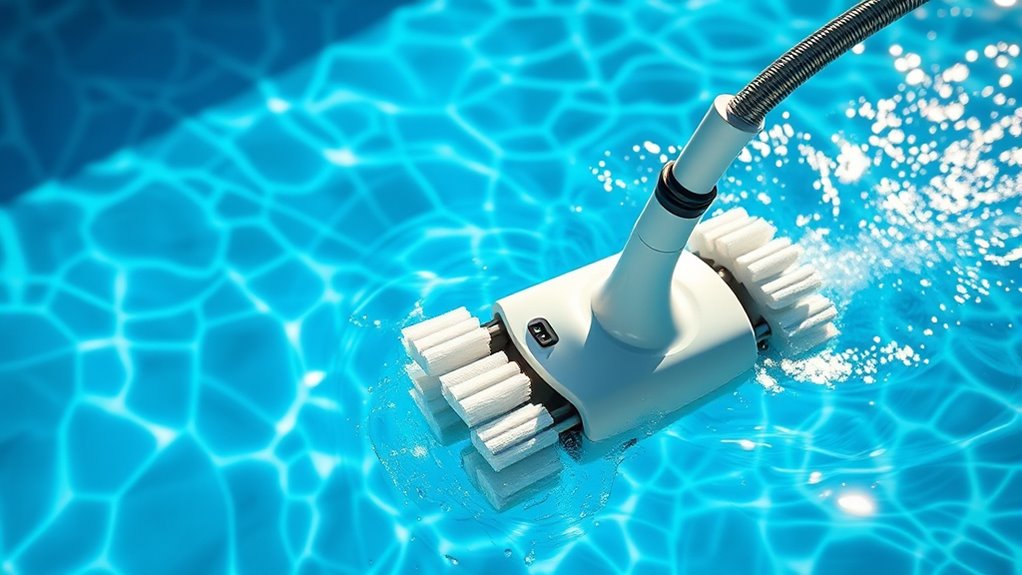
Pressure pool cleaners are designed to work effectively across various pool types, but compatibility can vary depending on the specific model. You need to consider how well the cleaner adapts to your pool surface, whether it’s concrete, vinyl, or fiberglass. Some models excel at pool surface adaptation, providing thorough cleaning without damaging delicate surfaces. Additionally, check the compatibility with pool accessories, such as skimmers and return jets, to ensure seamless operation. Not all cleaners work equally well with every pool type, so verify that the model you choose is suitable for your pool’s construction and features. Proper compatibility guarantees ideal cleaning performance and reduces the risk of issues down the line, making your pool maintenance more efficient. For optimal results, selecting a tuned pressure cleaner that matches your pool’s specifications can significantly enhance cleaning efficiency and longevity.
Hose Length and Flexibility
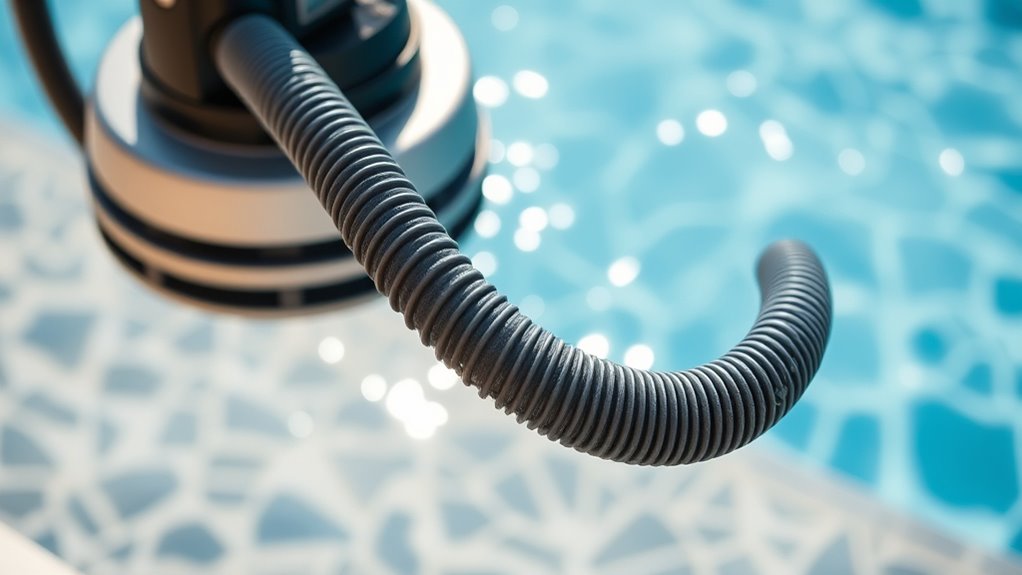
Choosing the right hose length and flexibility is essential for effective pool cleaning, as it directly impacts your cleaner’s ability to reach all areas without hassle. A flexible tubing system allows the hose to bend and navigate around obstacles easily, ensuring thorough coverage. An extendable hose gives you the versatility to adjust length based on your pool size, preventing the cleaner from being too short or too long. Look for a model with a durable, flexible tubing that resists kinks and tangles, making operation smoother. Proper hose length guarantees you won’t have to constantly reposition the cleaner or worry about missing spots. Ultimately, a well-designed extendable hose and flexible tubing improve maneuverability, saving you time and effort during pool maintenance.
Control Options and User Interface
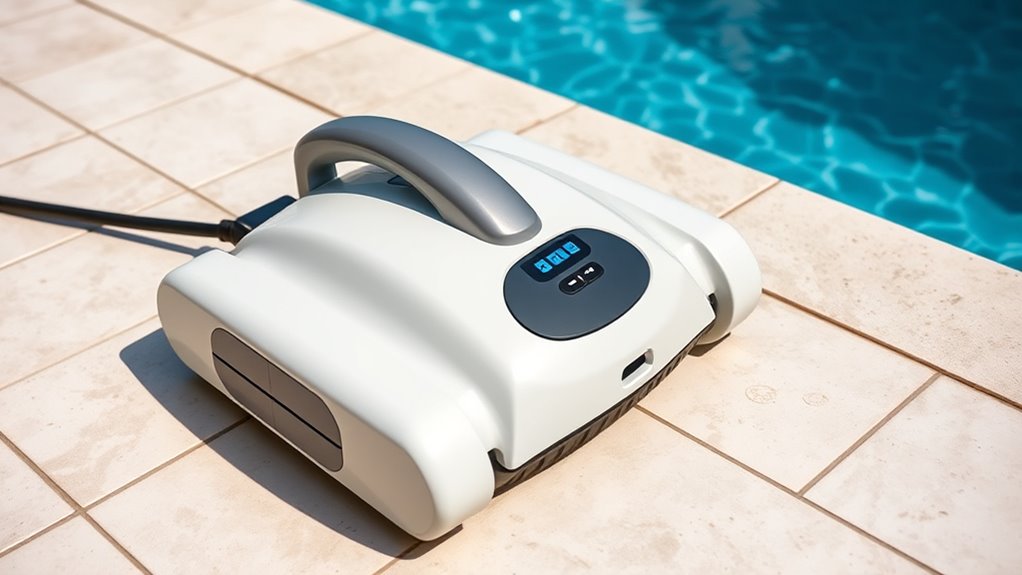
How intuitive is the control interface on your pool cleaner? A user-friendly interface makes your cleaning routine easier. Look for a remote control with simple buttons or a digital display that shows your selected mode. Imagine controlling your cleaner with ease, switching between cleaning cycles effortlessly. Additionally, efficient control options can significantly improve your overall experience by providing quick and seamless adjustments.
Energy Consumption and Noise Levels
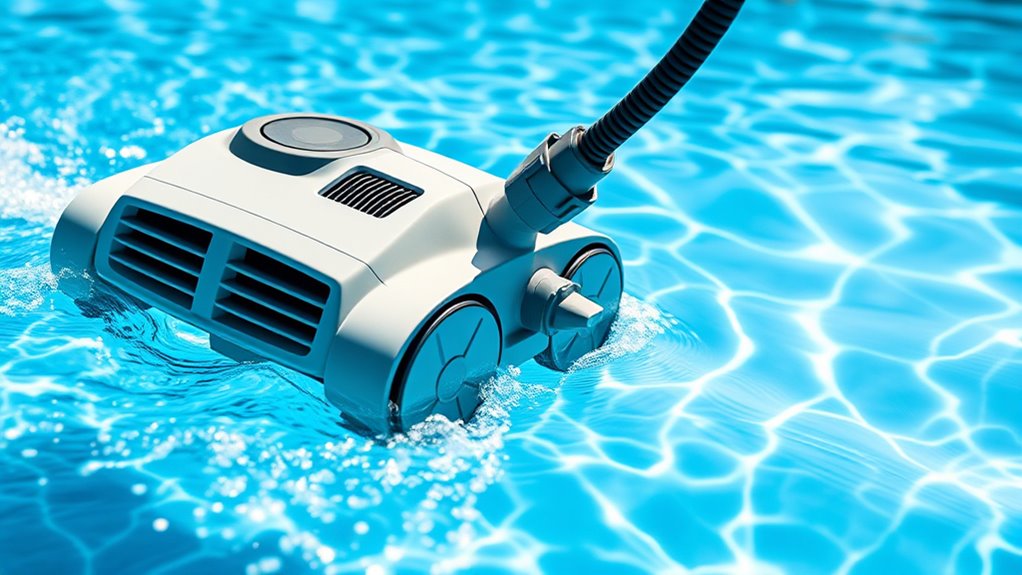
When choosing a pressure pool cleaner, you’ll want to contemplate its power efficiency ratings to save energy and reduce costs. Quiet operation features help keep noise levels down during cleaning, making the experience more pleasant. Additionally, energy-saving modes can further lower power consumption without sacrificing cleaning performance.
Power Efficiency Ratings
Are you concerned about how much energy your pressure pool cleaner uses or how loud it gets during operation? Power efficiency ratings help you evaluate these factors. Look for models that incorporate solar power options, which can reduce electricity bills and environmental impact. Additionally, consider the battery life of cordless units—longer battery life means fewer interruptions and better cleaning coverage. Energy-efficient cleaners use less power without sacrificing performance, saving you money over time. Keep in mind that some models are designed with smart power management features to optimize energy use during operation. Furthermore, advances in AI chip developments contribute to smarter and more efficient cleaning cycles that adapt to your pool’s specific needs. Incorporating energy-efficient technology can significantly enhance the overall sustainability of your pool maintenance. Also, choosing models with low noise levels can improve your pool cleaning experience by minimizing disruptions. As AI-driven innovations continue to improve power management, these cleaners become even more effective and eco-friendly. Moreover, understanding power efficiency ratings can help you make informed decisions when selecting a cleaner that balances performance with energy savings.
Quiet Operation Features
Choosing a pressure pool cleaner that operates quietly can considerably enhance your pool maintenance experience. Quiet models reduce noise pollution and make cleaning less disruptive. Look for cleaners with an automatic shutoff feature that pauses operation when cleaning is complete, helping to minimize unnecessary noise. A model with a remote control allows you to start, stop, or pause cleaning from a distance, giving you better control and reducing sounds during operation. These features not only improve comfort but also contribute to energy efficiency by preventing prolonged running times. Low noise levels make pool maintenance more enjoyable, especially if you prefer early morning or late evening cleaning sessions. Prioritize quiet operation features to enjoy a peaceful backyard while keeping your pool spotless. Additionally, selecting a model with energy-efficient components can further reduce power consumption and operational noise, which is supported by industry trends favoring sustainable and cost-effective solutions.
Energy Saving Modes
Energy saving modes on pressure pool cleaners help reduce both energy consumption and noise levels, making your pool maintenance more efficient. These modes optimize the cleaner’s operation by adjusting power use, which can complement your solar panels and enhance overall energy efficiency. When your cleaner runs during off-peak hours, it uses less electricity, helping you save on energy bills. Additionally, lower noise levels mean less disturbance, especially if you run the cleaner early in the morning or late at night. Some models even integrate with pool heating systems, ensuring the cleaner operates only when necessary. By choosing a pressure pool cleaner with energy saving modes, you support eco-friendly practices while maintaining a clean, inviting pool with minimal impact on your energy resources.
Maintenance Requirements and Ease of Cleaning
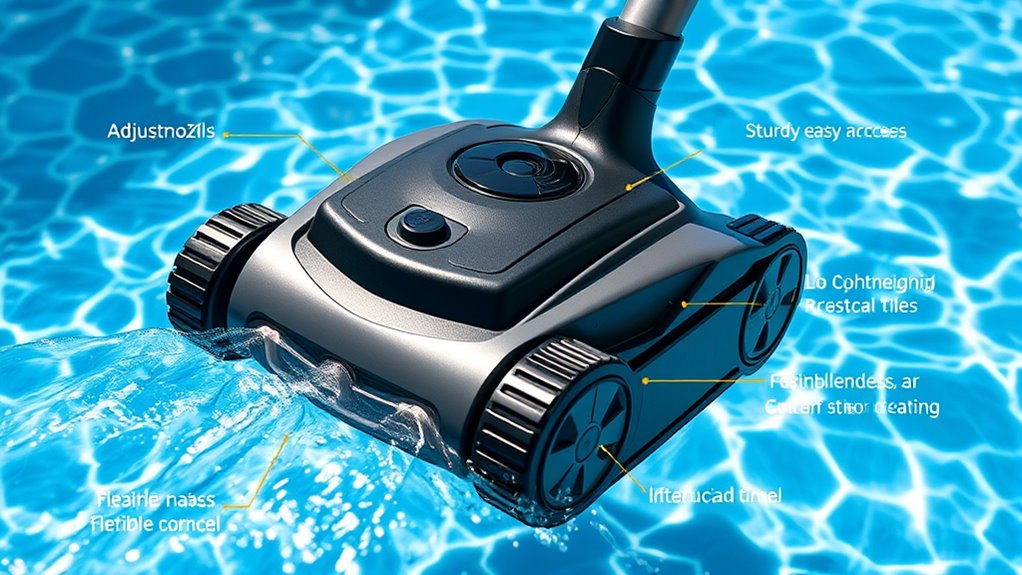
Maintaining a pressure pool cleaner is generally straightforward, but staying on top of regular upkeep ensures peak performance. You should check and clean the filter regularly to prevent clogs and maintain suction power. The cleaning frequency depends on pool usage and debris levels, but a good rule is once every two weeks. Proper filter maintenance reduces strain on the motor and extends its lifespan. To simplify maintenance, look for models with easy-access filters and clear instructions. Here’s a quick guide:
| Maintenance Task | Frequency |
|---|---|
| Filter cleaning | Every 1-2 weeks |
| Debris removal from cleaner | Weekly |
| Inspecting hoses and fittings | Monthly |
Keeping up with these tasks keeps your cleaner running efficiently and prolongs its lifespan.
Price and Warranty Coverage
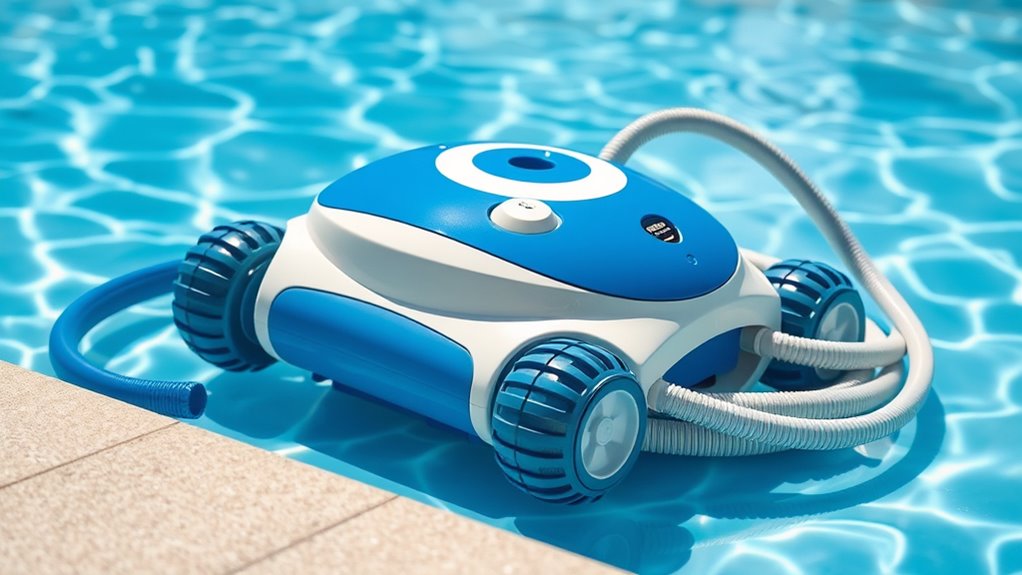
When choosing a pressure pool cleaner, price and warranty coverage are key factors to contemplate. You’ll want options that fit your budget without sacrificing quality, and a warranty that offers solid protection. Let’s explore how affordability and warranty length can influence your decision.
Affordability and Budget Fit
Affordable pressure pool cleaners come with a range of price points to fit different budgets, making them accessible for most homeowners. If you’re concerned about budget constraints, there are plenty of affordable options that deliver reliable cleaning without breaking the bank. These models often provide essential features and effective performance at a lower cost, helping you stay within your budget. When shopping, compare the prices to find a device that offers the best value for your money. Keep in mind that spending a little more on a reputable brand can sometimes save you money in the long run, thanks to better durability and efficiency. Ultimately, finding a pressure pool cleaner that balances affordability with quality ensures you get a device that meets your cleaning needs without overspending.
Warranty Duration and Coverage
Warranty duration and coverage play a significant role in choosing the right pressure pool cleaner, especially when balancing cost and value. You should look for models offering extended warranty options, which provide added peace of mind and protect your investment longer. Pay attention to coverage limitations, as some warranties only cover specific parts or repairs, leaving you responsible for others. A longer warranty period indicates manufacturer confidence in the product’s durability, but it’s essential to verify what’s included beyond the initial coverage. Read the fine print to understand what’s protected and for how long. Ultimately, selecting a cleaner with extensive coverage and an extended warranty can save you money and hassle if issues arise down the line.
Frequently Asked Questions
How Often Should I Perform Maintenance on My Pressure Pool Cleaner?
You should follow a regular maintenance schedule to keep your pressure pool cleaner in top shape. Generally, check and clean the filter and brushes weekly, especially during heavy use or after storms. Inspect the hoses and connections monthly for wear or blockages. Adjust your cleaning frequency based on pool usage and debris levels, but a consistent routine guarantees ideal performance and prolongs your cleaner’s lifespan.
Can Pressure Pool Cleaners Be Used for Above-Ground Pools?
While it might seem surprising, pressure pool cleaners can indeed be used for above-ground pools. You just need to check above ground compatibility and consider your pool size to make certain the cleaner works effectively. Smaller pools require less power, so choose a model designed for above-ground use. This way, you get efficient cleaning without overtaxing your equipment, making maintenance simpler and keeping your pool sparkling.
What Safety Features Are Included in Modern Pressure Pool Cleaners?
Modern pressure pool cleaners often include safety features like safety sensors that detect obstacles or irregularities, preventing damage or accidents. They also come equipped with emergency shutoff systems, which automatically turn off the cleaner if there’s a malfunction or if it’s lifted from the pool. These features help guarantee safe operation, giving you peace of mind while keeping your pool clean and well-maintained.
How Do Weather Conditions Affect the Performance of a Pressure Pool Cleaner?
Weather impact can greatly affect your pressure pool cleaner’s performance. Heavy rain or strong winds may stir up debris, making it harder for the cleaner to operate efficiently. Cold temperatures can also cause parts to freeze or become less effective, while hot, dry weather might lead to more dust and dirt in your pool. Monitoring the pool environment and adjusting cleaning schedules accordingly helps guarantee your cleaner works at its best despite changing weather conditions.
Are Replacement Parts Readily Available for Popular Pressure Pool Cleaner Models?
You’ll find that replacement parts, like spare parts, are generally readily available for popular pressure pool cleaner models. Manufacturers often stock these parts to guarantee compatibility issues are minimized, making repairs easier and more convenient. Before purchasing, check if the spare parts are compatible with your specific model to avoid compatibility issues later. This ensures your cleaner stays in top shape without hassle, saving you time and money.
Conclusion
When choosing a pressure pool cleaner, prioritize powerful suction, smart navigation, easy setup, and durable build. Consider its compatibility with your pool, user-friendly controls, and energy efficiency. Don’t forget to weigh the maintenance ease and warranty coverage. By focusing on these features, you’ll enjoy a cleaner pool, effortless operation, and peace of mind. Make an informed decision, invest in quality, and transform your pool cleaning experience into a simple, satisfying routine.
